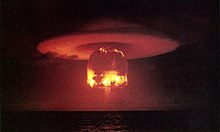
American Thinker
After constant exposure to critically important news, it begins to lose all meaning and sense of urgency. Hearing the same warnings over and over again -- especially when the status quo seems static -- can cause a certain desensitization, a resigned apathy that ignores the warnings in the wishful hope that they won't materialize.
This hope becomes more optimistic (and passive) with each passing day that the warnings do not materialize. One of the most evident examples of this phenomenon is the threat of a nuclear Iran. For years, the international community has been hearing about Iran's pursuit of nuclear weapons; for years, the world has been hearing Iran make bold, genocidal threats-most notoriously, that it will wipe the state of Israel off the map. But so far, Iran reportedly still has no nukes, and no large attack has been launched on Israel. Thus, many have become desensitized to the situation -- including those charged with ensuring that a nuclear Iran never becomes a reality.
But that reality has never been closer, as we are warned in Noah Beck's recent novel, The Last Israelis . It is our current proximity to apocalyptic war that makes Beck's doomsday warning about a nuclear Iran so compelling. If the worst comes to pass, this chilling attempt to rouse the West from its torpor could turn out to be that final, horribly prophetic alert that went unheeded.
Much of the public is conditioned by the mainstream media and government to focus on the short-term -- U.S. presidents tend to concentrate only on matters pressing during their tenure -- and rarely ever on longer-term issues or threats. Thus, a nuclear holocaust in the Middle East seems unrealistic. Add to this the fact that virtually all nations with nukes have never used them, and one can see why a certain apathy prevails when it comes to the idea of a nuclear Iran.
But Iran is different. Its Shiites leaders believe that at the end of times, a 9th-century prophet, the 12th Imam, will reappear to kill all the infidels and raise the flag of Islam in all four corners of the world. Reza Kahlili, a former CIA operative in Iran's Revolutionary Guards, reported last year on the apocalyptic statements from Iran's Supreme Leader, Ayatollah Ali Khamenei, who dictates Iran's nuclear policy. Khamenei's statements, which were carried by Iranian state media, proclaimed that "The issue of Imam Mahdi is of utmost importance, and his reappearance has been clearly stated in our holy religion of Islam. We must study and remind ourselves of the end of times and Imam Mahdi's era... We must prepare the environment for the coming so that the great leader will come." Kahlili also translated Iranian news reports from last June suggesting that Iran's newly elected president, Hassan Rouhani (the so-called "moderate"), shares Khamenei's views. The reports quote Rouhani thanking the Islamic messiah for his June 15th electoral victory.
Read more about Mideast Nuclear Holocaust
No comments:
Post a Comment